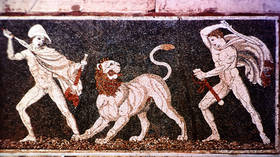Alexander the Great Netflix series is ‘fiction’ – Greek minister


A Netflix drama-documentary series that depicts the Macedonian ruler and military leader Alexander the Great as being in a gay relationship has been labeled as “extremely poor-quality fiction” by Greece’s culture minister.
Lawmaker Lina Mendoni’s comments about the six-part series come amid a brewing scandal over its suggestion that Alexander, king of the ancient Greek kingdom of Macedon, was involved in a romantic relationship with his general Hephaestion – a figure referred to by Roman historian Quintus Curtius as being “by far the dearest of all the king’s friends.”
Speaking to parliament last week, Mendoni said that the series – titled ‘Alexander: The Making of a God’ – is “replete with historical inaccuracies,” which she said “demonstrates the director’s sloppiness and poverty of scenario.”
Referencing Alexander’s alleged affair with Hephaestion, Mendoni said that “there is no mention in the sources that it goes beyond the limits of friendship.”
In an opinion piece earlier this month, the Greek daily Eleftheros Typos said that the Netflix representation of the ruler of Macedon is a “distortion of the truth,” and blamed the 2004 Oliver Stone film ‘Alexander’ for initiating “a propaganda campaign about Alexander’s homosexuality.”
Similarly, Dimitris Natsiou, president of the far-right Christian Orthodox political party Niki, said last week that the series seeks to “subliminally convey the notion that homosexuality was acceptable in ancient times, an element that has no basis.”
However, according to Lloyd Llewellyn-Jones, a professor at Cardiff University in Wales, homosexual encounters were prevalent in ancient Greece.
“Same-sex relationships were quite the norm throughout the Greek world,” Llewellyn-Jones says in the first episode of the series. “The Greeks did not have a word for homosexuality, or to be gay. It just wasn’t in their vocabulary whatsoever. There was just being sexual.”
Despite the furor, however, Mendoni rejected a suggestion posed by Natsiou during last week’s parliamentary session to take legal action against Netflix, saying that doing so would be unconstitutional.
“The ministry of culture does not exercise censorship, does not carry out actions that result in prosecution or ban, does not manipulate, does not limit, does not control the dissemination of information and ideas neither preventively nor repressively,” she said.
During Alexander’s 13-year reign as the king of Macedonia, he created one of the largest empires seen in the ancient world, expanding from Greece to northwestern India before his death at the age of 32 in 323 BC.
Last year, Netflix also came under fire from groups in Egypt who said that the casting of a black actor in the role of the country’s last Pharaoh, Cleopatra, was a “falsification” of Egyptian history.